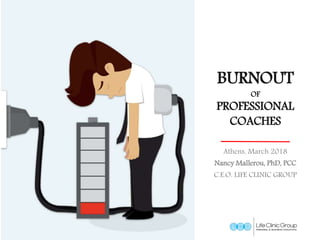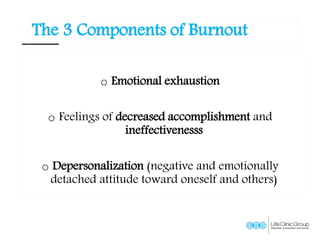Coaches' burnout
- 1. BURNOUT OF PROFESSIONAL COACHES Athens, March 2018 Nancy Mallerou, PhD, PCC C.E.O. LIFE CLINIC GROUP
- 2. LIFE CLINIC GROUP Pioneers in Coaching Since 2006 50 Titles 3.000 Executive s 10.000 Hours 15.000 Individuals
- 3. Striving for Excellence, Ethos, and Balance in the corporate world 1:2:1 Sessions Team/ Group Coaching Corporate Retreats Training Programs LIFE CLINIC GROUP
- 4. AREAS OF EXPERTISE RESILIENCE/ BURNOUT PREVENTION AGILITY SELF - LEADERSHIP (EMPLOYEE) HAPPINESS COACHING SKILLS
- 7. HAPPINESS & PRODUCTIVITY HAPPY COACH = PRODUCTIVE COACH
- 8. What Is Stress? ŌĆó Stress is defined as a personŌĆÖs response to a disturbing factor in the environment, leading to physical, psychological or behavioral divergence ŌĆó Stress refers to a mental or emotional state, wherein a person encounters tension sue to adverse conditions
- 9. What Is Burnout ŌĆó "A state of physical, emotional, and mental exhaustion caused by long term involvement in emotionally demanding situations." ŌĆō Ayala Pines and Elliot Aronson. ŌĆó "A state of fatigue or frustration brought about by devotion to a cause, way of life, or relationship that failed to produce the expected reward." ŌĆō Herbert J. Freudenberger.
- 10. STRESS BURNOUT Meaning Stress implies an adaptive response to any kind of demand caused due to adverse circumstances. Burnout refers to a state of mental or emotional tiredness, occurs out of continuous exposure to stress. Feeling Anxiety, mood swings, guilt. Hypertension, mental depression, impatient, irritable. Encounters Fatigue Chronic Exhaustion Loss of Motivation and hope Physical energy Work Dissatisfaction with work Bored and cynical about work. Job commitment Dropped off Virtually zero Results in Lack of concentration, tends to forget things. Forgetfulness is frequent. Undergoes Physiological changes Psychosomatic complaints Stress Vs Burnout
- 11. The 3 Components of Burnout o Emotional exhaustion o Feelings of decreased accomplishment and ineffectivenesss o Depersonalization (negative and emotionally detached attitude toward oneself and others)
- 12. Burnout Factors for Professional Coaches o Multiple Social Roles o Multiple Roles at Work o No boundaries o Insecurity (e.g. Fluctuating Income, external environmentŌĆ”) o Inadequate training and skills for the job o Failing to take care of oneŌĆÖ s physical and emotional needs o Specific personality traits: ŌĆó Perfectionistic ŌĆó Harshly self-critical ŌĆó very empathetic ŌĆó Idealistic
- 13. Take the test Source: Mindtools
- 15. HABITS OF HIGHLY RESILIENT PEOPLE Have REALISTIC OPTIMISM Seek opportunities for GROWTH & LEARNING Feeling GRATEFUL Build strong SUPPORT SYSTEMS Practice SELF - CARE
- 16. Preventing Coach Burnout 1. Take Care Of Yourself 2. Manage Your Energy / Time 3. Work with purpose 4. Self Efficacy 5. Manage Stress 6. Invest in Professional Help 7. Develop Resilience 8. Restore Lifestyle Balance 9. Seek Peer Support 10. Keep Evolving
- 17. THANK YOU Nancy Mallerou, PhD, PCC LIFE CLINIC GROUP

















